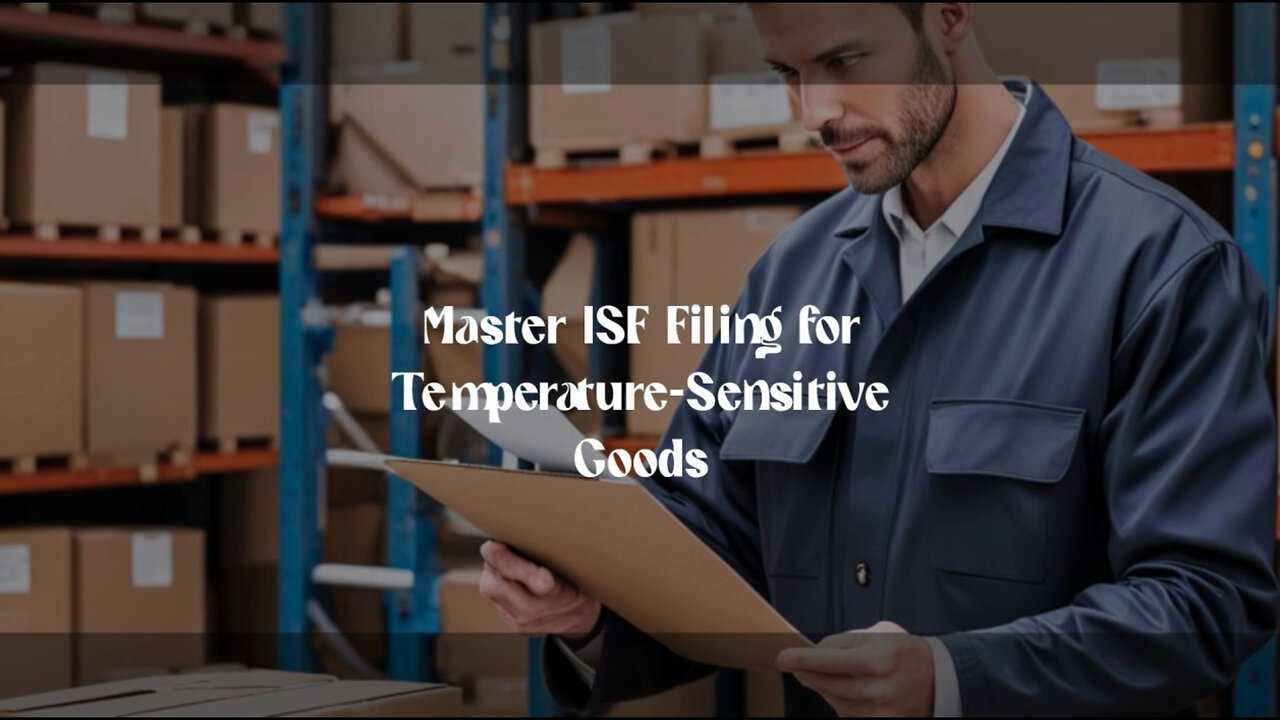Premium Only Content

Mastering ISF Filing: Essential Tips for Temperature-Controlled Shipments
ISF Filer || isf@isffiler.com || 858-280-9374 || www.isffiler.com
In this video, the presenter provides five effective tips for Importer Security Filing (ISF) of temperature-controlled shipments. The first tip is to understand the requirements set by the US Customs and Border Protection (CBP) for temperature-controlled goods. The second tip is to provide detailed information about the goods, including temperature range, handling instructions, and necessary permits. The third tip is to choose a reliable customs broker specializing in temperature-controlled shipments. The fourth tip emphasizes the importance of planning ahead to avoid last-minute rush or fines. The final tip advises monitoring the progress of shipments to ensure their integrity. By following these tips, viewers can streamline the ISF filing process for temperature-controlled shipments and ensure compliance with regulations.
#ISFfiling #temperaturecontrolledshipments #customsbrokerage #internationaltrade #shippingtips #compliance #logistics #timemanagement #customsclearance #shipmentmonitoring
Video Disclaimer Here: This video is intended for educational purposes and has no affiliation with US government entities.
"00:51 - Understand ISF Requirements: Familiarize yourself with the specific guidelines and regulations set by U.S. Customs and Border Protection (CBP) for temperature-controlled shipments to avoid delays.
01:10 - Provide Detailed Information: Ensure accuracy by including precise details about the shipment, such as temperature ranges and special handling instructions, to facilitate smooth customs clearance.
01:31 - Choose an Experienced Customs Broker: Select a knowledgeable customs broker who specializes in temperature-controlled shipments to help navigate the ISF filing process and ensure regulatory compliance.
01:50 - Plan and Monitor: Initiate ISF filing well in advance to manage time effectively, and keep track of shipment progress, including temperature records, to protect the integrity of your cargo during transit."
-
 39:01
39:01
The Why Files
8 days agoSymbols of Power: Deciphering the Language of the Secret Elite
86.9K56 -
 1:07:16
1:07:16
Edge of Wonder
6 hours agoWho Are the Men in Black? The CIA Connection
7.85K2 -
 45:17
45:17
The Officer Tatum
7 hours agoLIVE: Scott Jennings INCINERATES CNN, DNC Union BEGS For Money, + MORE | OT Show EP 15
88.6K95 -
 14:45
14:45
Tundra Tactical
3 hours ago $1.34 earnedFirst Impression of the Labradar LX Chronograph.
20.6K -
 54:52
54:52
LFA TV
23 hours agoAnti-Trump Lawfare Has Failed | Trumpet Daily 11.26.24 7PM EST
21.1K1 -
 29:44
29:44
Standpoint with Gabe Groisman
9 hours agoEP. 59. The State of Western Militaries Today. Col. Richard Kemp
42.6K3 -
 47:24
47:24
Candace Show Podcast
5 hours agoConor McGregor: GUILTY—But Of What? | Candace Ep 111
107K217 -
 13:19
13:19
Josh Pate's College Football Show
5 hours ago $1.29 earnedThe SEC has COLLAPSED!! Updated CFP Picture with Josh Pate
18.3K1 -
 45:59
45:59
PMG
20 hours ago $0.26 earned"Hannah Faulkner and Sabrina Cardone | Empowering the Next Generation"
12.6K1 -
 1:19:57
1:19:57
Awaken With JP
9 hours agoThanksgiving for America Special - LIES Ep 67
119K45